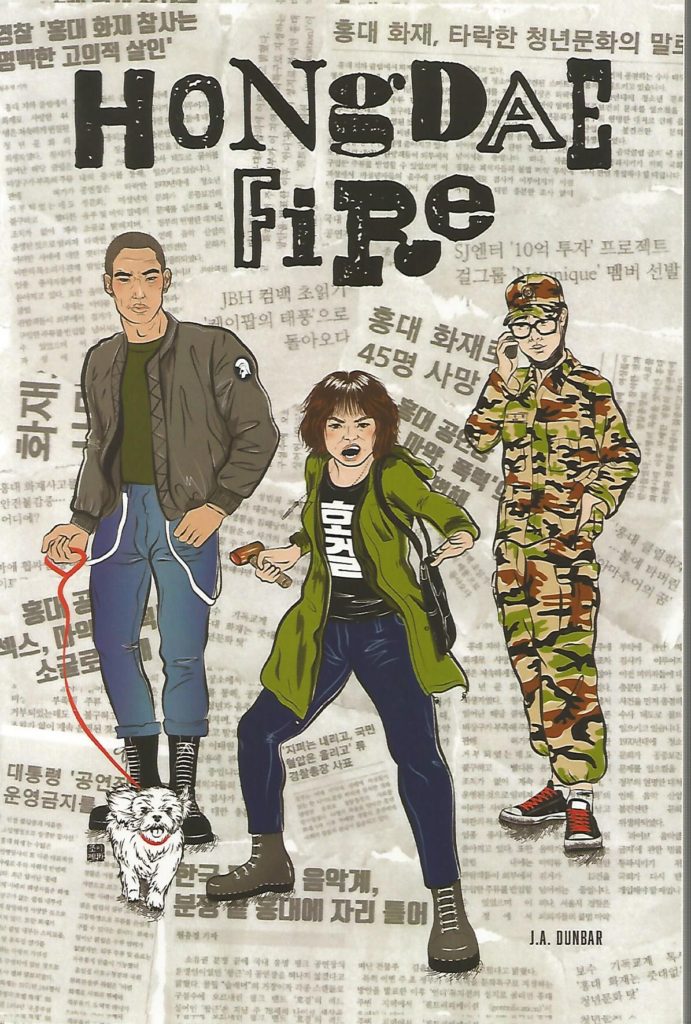Hongdae Fire by Jon Dunbar
Reviewed by William Urbanski.
I am going to start this review by saying I liked this book quite a bit. Admittedly, after going through the first few pages, it was unclear what direction it would take, but I was pleasantly surprised by a couple of stand-out features, namely, the character development, the grittiness (which tends to be glossed over in other depictions of Korea), the use of locations throughout Seoul, and the incorporation of several prominent themes in Korean society. While parts of the book may seem over the top and quite graphic (it is definitely not PG-13, if you know what I mean), I think it does a good job of “borrowing” inspiration from real-world events and combining them with just enough creative storytelling to make it a page-turner. Besides the story itself, it also serves as somewhat of a primer on important narratives on the peninsula.
Plot Overview and Themes: Drowning in the Mainstream
The story, which takes place in approximately 2005, centers around a lethal fire at an underground punk rock club called “Slammer” and the attempts of the story’s protagonist, 6kyung, to uncover the truth behind it. Shortly after the fire is put out, the presence of a bike lock on the door to the venue reveals that the fire was indeed deliberately set, resulting in the fire becoming a murder investigation. Now, I am not exactly Colombo, but it was fairly obvious to me who actually set the fire. What was completely unexpected were the reasons behind it and how the fire became a focal point of several co-existing and competing narratives in Korean society, such as conservative vs. progressive, new vs. old, and obedience vs. rebellion. The story also draws attention to the connections between politics, religious groups, and business.
The whole concept of punk rock as a subculture of mainstream society is something more people should examine, even if they do not want to spike their hair and kick over a speaker while wearing army boots. Mainstream society, be it in Korea or North America, tends to be homogeneous and conformist with a very narrow range of acceptable behaviors and life paths. Hongdae Fire (and the punk rock scene as a whole, for that matter) poses an important question: Is there another way to meaningfully exist without adhering to the values and ideals of the majority, or “drowning in the mainstream,” so to speak?
Character Development
The main character is 6kyung, a nickname derived from her job collecting six-thousand-won admissions at Slammer. She is a little bit of a counter-culture figure (being a part of the punk rock scene and all) and eschews most of the common mannerisms and expected social courtesies of Korean society in the mid-2000s. She swears, drinks, is extremely direct, wears shabby clothes, and constantly picks her nose. Despite her rough-around-the-edges persona, she is quick-witted, tough, and earned a reporter position at the fictional Koryo News. Overall, she is a likeable character, and even though she does not fit in with Korean society per se, from a North American perspective, she is still pretty conservative in that she is not involved in anything particularly dubious or criminal.
Her sidekick is a skinhead (i.e., a member of the punk rock scene who embodies a tough aesthetic without espousing the hateful virtues of Nazis or other supremacist groups) named “Bam-Bam,” who carries around a cute puppy whom he calls “Yeobo,” a term usually reserved for one’s spouse. He is a big dude and, on the surface, appears to be a bit of an idiot; however, he is surprisingly resourceful and reliable. My favorite part involving Bam-Bam is when he goes dumpster diving in an apartment complex and is able to scavenge enough computer equipment to set up a surveillance system. One scene in particular that made him more believable is when he gets a severe beat-down by the police and is put out of commission for a few weeks.
There are many other characters in the book, and on this is a point: I feel some of the characters were a little overdeveloped. One section that illustrates my point takes place at a funeral home where there is a huge, three-day group funeral for the more than forty people who died in the fire at Slammer. 6kyung walks into various rooms one-by-one, and we learn a little about each character. I appreciate the thought and effort that went into developing the character backgrounds, though I felt this could have been edited out since we did not really see much of these characters, and they did not really play an important role in the story (besides dying in a fire).
Criticisms
After taking a few days to reflect on the book, I would say that Hongdae Fire is, in some ways, a little too comprehensive. That is to say, plot-wise, it is pretty convenient that the fire at the club brings together so many different aspects of Korean culture. Without spoiling the story, the reasons behind the fire involve political corruption, greedy developers, religious fanatics, a K-pop agency, and even a plastic surgery clinic. The book basically covers the entire gamut of everything that could possibly happen in Korea.
One thing that I actually did not like at all was the negative portrayal of Western foreigners in the book, namely, English teachers involved in the music scene. While of course I have encountered my fair share of foreign teachers who just come to Korea to party, I felt that the drug-using, fight-starting foreigners (who also attempt to take up-skirt photos of a passed-out girl) were pretty exaggerated and not consistent with my experience here. On the same note, I felt that this was a deliberate choice by author Jon Dunbar to “shame” such behavior through parody.

As well, I think some people (Koreans especially) may take offense to parts of this book – not because they are unrealistic, but because the book highlights certain aspects of Korean society that most people would prefer to be left unmentioned. To them, I would say that Dunbar did a good job of melding fiction and creative storytelling with facts. I was following up with Dunbar about some plot points, and he said that he was concerned that readers may think he was portraying Korea in a negative light, and that is why he thought it was important to incorporate themes that were “ripped from the headlines” (being a copy editor at The Korea Times, he had no lack of relevant news content to draw from). He also mentioned that a scene in which several of 6kyung’s friends storm the parliament building would have seemed unrealistic until certain unfortunate events in America only a couple of months ago.
A Love Letter to the Punk Scene
Although not much of a punk rocker myself, I appreciate Hongdae Fire’s stark juxtaposition of the traditionally conservative and hierarchal Korean society at large and the egalitarian and progressive punk scene. To that end, I feel that Hongdae Fire is not only a love letter to the punk scene everywhere, but also a convincing underdog story.
Besides the plot, the characters, and the Korean context, there is another big reason you should read this book, and that is Dunbar’s clean but colloquial writing style, which paints a mental picture of the settings without getting overly descriptive. Even for someone who has never been to Seoul, it is very easy to visualize the action taking place. When 6kyung was in Slammer, sleeping at the police station (in the journalist’s room, not as a prisoner), or infiltrating a religious compound, I felt like I was right there. Given the number of locations in the book, this is quite an achievement.
There are some unresolved plot lines and a few unanswered questions in the story (such as why 6kyung happens to speak fluent English), but for the most part, the crises are resolved without resorting to deus ex machina (a literary pet peeve of mine) while also leaving the door open for a possible sequel: perhaps one that will take place in Gwangju?
Graphic courtesy of Jon Dunbar.
The Reviewer
William Urbanski is the managing editor of the Gwangju News. He is married to a wonderful Korean woman, always pays cash, and keeps all his receipts. Instagram: @will_il_gatto







